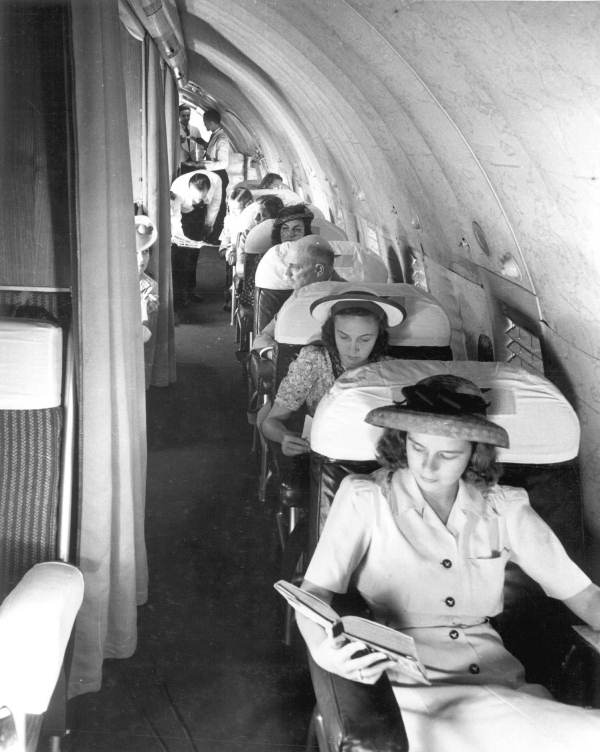Do Airlines WANT Their Passengers to Suffer from Jetlag?

I do not fly long haul flights very often, so perhaps certain things that are normal for regular passengers is strange for me. However I do not believe that just because things have always been done that way, it should be a reason for continuing .
When flying to the US last week, I noticed that on my two international flights, the airlines had has their starting point for the inflight service the departing time zone rather than the one of the destination. It would seem more natural and efficient for the passengers to allow adjustment to the new time zone on the plane rather than spend their time on the ground either before or after to do so.
I mentioned my theory to one of the airhosts, and he could not offer an explanation for why the practice on airlines is as it is. But that personal tastes and responses to time changes are different from person to person and that many people had been at the airport for at least 2 hours, so would appreciate being served food as soon as possible when airborne. My fellow-passenger told me with a smile that the personnel on flights were not there to provide service but to ensure safety.
I flew with United Airlines (my first time with them, but with no guitars, see here why) from London Heathrow Terminal 1 to San Francisco. A flight of 11 hours during daylight departing London at 1410 (local time BST) arriving in San Francisco at 1711 (local time PDT).
The meals served on board were a late lunch and then a snack. I managed to get nearly an hour of sleep before the lunch was served and I was woken up. Luckily I managed to get some more sleep afterwards, perhaps because the in-flight-entertainment was not working.
My return flight was with SAS direct from Washington Dulles Airport. The flight was scheduled to last 7 hours, which should be a decent if somewhat short night’s sleep.
However about an hour and a half after boarding and later take off when there was no more turbulence. Lights were put on again in the cabin while the crew prepared to serve dinner. In spite of being told that they would try to clear off and turn down lights as soon as possible. It took about two hours before dinner had been cleared away, tea and coffee (!) served and consumed by passengers. At this point in the journey time was between 1 am and 3 am in Copenhagen where the plane was destined. After a bit more than 2 hours lights were turned on again as the crew noisily prepared to serve breakfast.
I am left wondering can things not be done differently?
One of my main quibbles is the serving of food just when people have fallen asleep after take-off. If serving food is to prevent people from being hungry on the flight, and we agree that we would like to avoid disturbing everyone by lighting up the cabin and handing out trays. I see a few possibilities:
- Food coupons could be handed out together with the boarding card, which could be exchanged for a meal in the airport before boarding the flight.
- Meals could be packed and handed to passengers when they arrive at the gate or when they enter the aircraft. This cold meal could then be complimented with hot rolls and drinks when on the air craft. Often already served separately from the airline-food-trays.
- Passengers could collect food at the kitchen of the aircraft avoiding distribution but of course would create extra traffic in the corridors. However perhaps this would also create less food waste? Or would people regard it as a buffet and take more food than they would consume and perhaps certain popular things would run out.
Another thing that could help is the lighting in the cabin.
In order to ensure less light in the cabin people should be encouraged to dim the brightness of their devices. Besides allowing their fellow passengers a better rest, it will also improve the energy level of their device during the journey.
Most aircrafts have screens in every seat, when people are not using them, it would be preferable for them to be switched off to reduced the light in the cabin.
So over to you, Delta, SAS, BA, United Airlines, and all the rest. Can’t we join up to form an alliance against jetlag. Now that would be a STAR alliance!!
birgitte
This study suggests you shouldn’t eat at all if you wish to minimise jetlag: http://news.bbc.co.uk/2/hi/health/7414437.stm
Adrian
A trick I tried flying LGW to YVR is you simply do not eat while on the plane. It’s only boredom that makes you stuff your face full of food that you wouldn’t throw to a rat if you were on terra firma. So just sip at water and eat fruit. Then, at your destination, eat the meal appropriate to the time of day there. You land in the morning you eat breakfast; land at noon you eat lunch. It’s all about tricking your body into behaving as though it is at the destination. I found it helped to avoid jet lag. And I felt thinner for a bit too!
karen
Sorry about being slow at replying. Yes not eating seems to be an agreed on trick.
Friend said that perhaps the airlines want us to be uncomfortable so that companies and people who want to spend the money will move up to business class. I find that kind of cynical, but hey you need to motivate people to pay much more for what would otherwise be basically the same service.